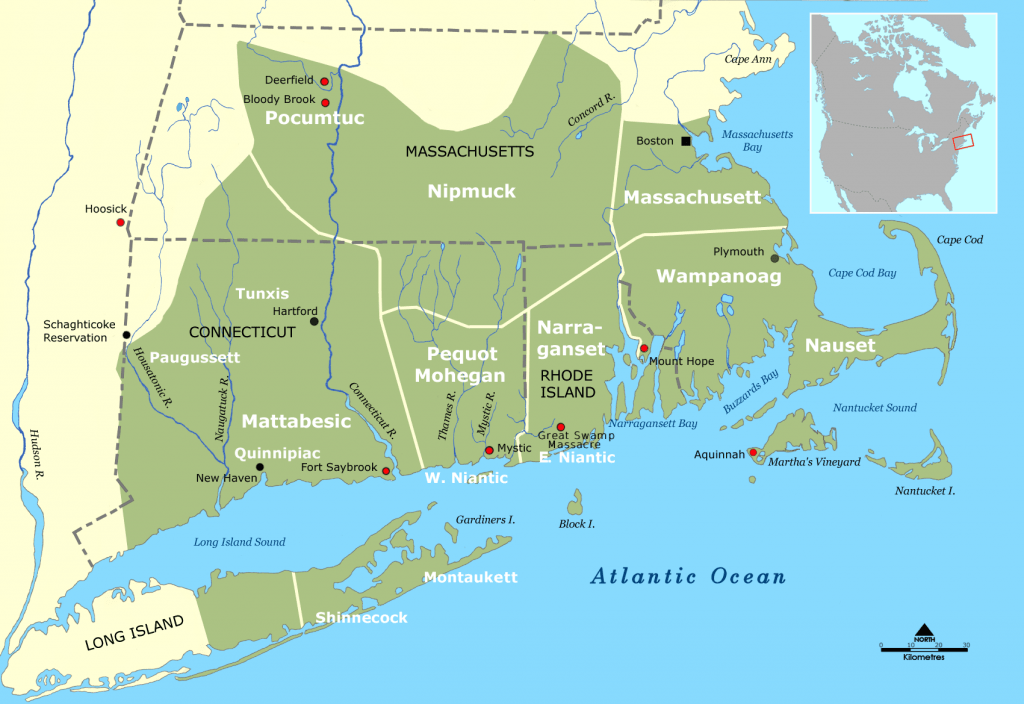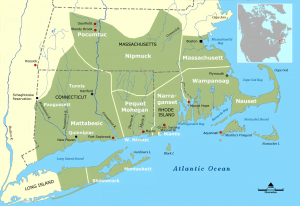
It is lamentable to reflect that in the primitive dealings between the venturous Europeans and aborigines of America, the kindly welcome and the hospitable reception were the part of the savage, and treachery, kidnapping, and murder too frequently that of the civilized and nominally Christian visitor.
It appears to have been matter of common custom among these unscrupulous adventurers to seize by force or fraud on the persons of their simple entertainers, and to carry them off as curiosities to the distant shores of Europe. Columbus, with kindly motives, brought several of the West Indian natives to the Spanish court; others, whom his follower Pinzon had kidnapped, he restored to their friends. Cabot, in his memorable expedition, followed the same example, and the early French discoverers were peculiarly culpable in this respect. Most atrocious of all was the conduct of Thomas Hunt, who, in 1614, at Monhigon, enticed twenty-four of these unfortunate people on board his vessel, and carried them to Malaga, as slaves an inhuman piece of treachery, to which the English were probably indebted for much of the subsequent hostilities evinced by the Indians of New England.
Arrival Of The Mayflower
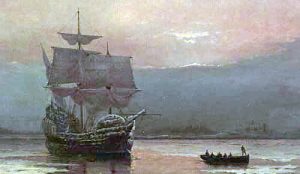
On the 6th of September, 1620, the Mayflower, freighted with forty-one adventurous enthusiasts, the germ of a western empire, sailed from Plymouth, in England; and on the 9th of the following November arrived on the barren and inclement shores of Cape Cod. A few days afterwards a reconnoitering party caught sight of a small number of the natives, who, however, fled at their approach. On the 8th of December a slight and desultory action occurred, the Indians attempting to surprise the Pilgrims by night. They were, however, discomfited, and compelled to retreat, leaving, among other trophies, eighteen arrows, “headed with brass, some with harts horns, and others with eagles claws.”
On the 11th of December (O. S.), memorable in the annals of America, the little band of Pilgrims landed, and fixed their first settlement at Plymouth. The Indians, it would appear, looked with evil eyes upon the pious colonists; for, says an old narrator, “they got all the powwows in the country, who, for three days together, in a horrid and devilish manner, did curse and execrate them with their conjurations, which assembly and service they held in a dark and dismal swamp. Behold how Satan labored to hinder the gospel from coming into New England.”
The appearance of the friendly chief Samoset, at the settlement; his welcome in broken English; his manners and discourse, are quaintly detailed by the historians of the colony. He had acquired some knowledge of the English language by intercourse with the crews and masters of vessels employed in fishing upon the coast, and readily communicated such information as the settlers required concerning the nature of the country and its inhabitants. He informed them of the manner in which the district where they were located had been depopulated only four years previous, by some incurable disease; a circumstance to which the feeble colony not improbably owed its preservation.
Samoset
Before the bold and friendly advances made by Samoset, the only communication between the colonists and the original inhabitants had been of a hostile character. The natural fears and jealousy of the savages, and the superstitious horror of the English at the heathenish pow wows and incantations which they witnessed, together with the want of a common language, had kept the little company of adventurers in a state of complete isolation during the whole of the cold and dreary winter that succeeded their arrival.
Tisquantum
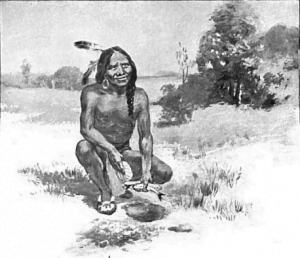
It was in the month of March that a peaceful communication was established with the natives, through the intervention of Samoset. He introduced, among other of his companions, the noted Tisquantum, or Squanto, who was one of the twenty-four kidnapped by Hunt, at a former period. By his knowledge of the country and coast, and his acquaintance with their language, Squanto became of great service to the colonists, and continued their friend until his death, which took place in 1622, while he was on his passage down the coast, in the capacity of pilot to an expedition fitted out for the purpose of purchasing supplies of corn and other necessaries. Much of romantic interest attaches to the history and adventures of this serviceable Indian, both during his captivity and after his restoration to his own country. Escaping by the assistance of certain kindly-disposed monks, from Spain, where he, with his companions, had been sold in slavery, he reached England, and was taken into the employment of a London merchant, named Slaney, by whom he was sent as pilot, or in some other capacity, to various places on the eastern coast.
He was brought back to Patuxet, the Indian name of the country in which the pilgrims first landed, by Captain Thomas Dermer, who sailed in the employ of Sir Ferdinando Gorges, during the summer preceding the arrival of the Mayflower. After his introduction by Samoset, he remained with his new allies, instructing them in the mode of raising corn, to which they were strangers; in the best methods of fishing; and making himself of inestimable service.
Massasoit
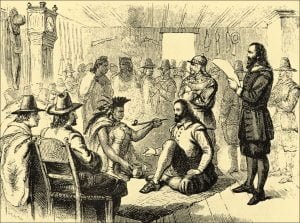
By the friendly influence of Squanto and Samoset, who acted as interpreters, a league of amity and mutual protection was effected between the colony and the powerful sachem Massasoit, father of the still more celebrated Philip. Massasoit’s head-quarters were at Mount Hope, on Narragansett bay, overlooking the present town of Bristol; a striking feature in a landscape of remarkable beauty, and commanding from its summit a magnificent prospect of island, bay and ocean. His authority extended over all the Indian tribes living in the vicinity of the Plymouth colony, and he held an uncertain but influential sway over portions of other nations far into the interior.
In the month of July, 1621, some of the principal inhabitants of the settlement, among others, Edward Winslow and Stephen Hopkins, went on an embassy to the court of this chief, as well to observe his power and resources as to renew the amicable treaties before entered into. They carried such attractive ornaments and apparel as would please the eye of a savage.
They were accompanied by Squanto; and although their entertainment, both as respects food and lodgings, was but sorry, yet they were received in a spirit of friendliness.
They obtained much useful information concerning the surrounding tribes, and also learned the power and numbers of the Narragansetts.
The ship Fortune arrived at Plymouth, in the month of November, bringing out thirty -five emigrants; but no provisions for their support; in consequence of which, the colony was not long after greatly distressed by want. To add to their troubles and fears, the Narragansetts sent them a hostile message, expressed by a bundle of arrows tied with a snakeskin. The skin was returned filled with bullets, and the governor made the spirited reply, “that, if they loved war rather than peace, they might begin when they would.”
The houses were thenceforth enclosed in palings, and every precaution was taken, by watch and ward, to guard against a sudden attack.

